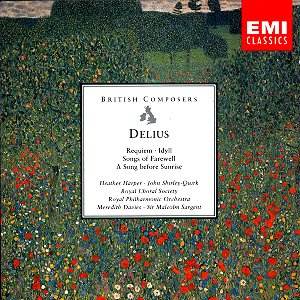 Composer: Frederick Delius
Composer: Frederick Delius
Works: Requiem (1916), Idyll – Once I Passed Through a Populous City (1902), A Song Before Sunrise (1918), Songs of Farewell (1928)
Performers: Heather Harper (soprano), John Shirley-Quirk (baritone), Royal Choral Society, Royal Philharmonic Orchestra / Meredith Davies (Requiem, Idyll), Royal Philharmonic Orchestra / Malcolm Sargent (Sunrise, Farewell)
Recording: Kingsway Hall, London, 19-21 Feb 1968, No. 1 Studio, Abbey Rd, Sunrise 2 Mar 1965, Farewell 22-23 Apr 1964
Label: EMI
Frederick Delius, often overshadowed by his contemporaries, emerges with renewed clarity in this newly issued compilation of his choral works, which includes the Requiem, Idyll, A Song Before Sunrise, and Songs of Farewell. Delius’s oeuvre is marked by a deep introspection and a sensitivity to the ephemeral beauty of life, which is starkly evident in these compositions. The Requiem, written against the somber backdrop of World War I, serves as a poignant meditation on mortality, devoid of traditional Christian consolation. This recording provides a unique opportunity to engage with Delius’s profound yet unorthodox approach to the genre, one that was met with ambivalence in its time.
The performances led by Meredith Davies and Malcolm Sargent reveal an intriguing dichotomy in interpretative styles. Davies’s handling of the Requiem and Idyll captures the work’s haunting quality, with orchestral textures that breathe and swell like the ebb and flow of tides, providing a fitting backdrop to the choral and solo lines. The Royal Choral Society delivers a performance that is notable for its precision and dynamic shading, particularly in the “Allelujah” section of the Requiem, where the antiphonal interplay between choirs evokes a sense of both reverence and defiance. John Shirley-Quirk’s baritone adds a richness that complements Heather Harper’s luminous soprano, whose ethereal presence in “A Song Before Sunrise” envelops the listener in a veil of nostalgia. The emotional weight of Harper’s performance is particularly striking at the climax of track 6, where her soaring lines meet the orchestral crescendo with breathtaking synergy.
Recording quality, while inherently limited by the analogue medium, retains a warmth that serves the music well. The slight hiss present in the Sargent tracks is an acceptable trade-off for the vibrant choral textures. The balance between orchestra and soloists is handled adeptly, though at times the orchestral weight slightly overshadows the choir. This is particularly evident in Sargent’s “Songs of Farewell,” where the sumptuous orchestration could benefit from a more transparent mix to allow the choral lines to emerge more distinctly. Despite this, the clarity of Delius’s harmonic language shines through, allowing listeners to appreciate the intricate counterpoint and the lush, impressionistic soundscape that characterizes his work.
Delius’s Requiem, often relegated to the shadows of more popular choral pieces, finds a worthy companion in this recording. Its unapologetic confrontation with death, articulated through the elegiac “Our days here are as one day,” juxtaposes poignantly with the more life-affirming themes found in Idyll and A Song Before Sunrise. The latter, with its serene melodies, serves as a tranquil counterbalance, showcasing Delius’s ability to evoke both melancholy and beauty in equal measure. This contrasts sharply with the more robust and vigorous character of the Songs of Farewell, which, under Sargent’s baton, radiate a golden glow, particularly in “Joy, Shipmate, Joy!” where the choir’s burnished tone envelops the listener, reminiscent of the choral traditions fostered by Vaughan Williams and Holst.
A significant aspect of this recording is its historical context; the Requiem premiered in 1922, at a time when the wounds of the Great War were still fresh. Delius’s unflinching exploration of loss and the finality of life presented a stark departure from the more comforting narratives offered by other contemporaneous composers. The recording’s annotations, while insightful, would have greatly benefited from including the texts of the Requiem and Idyll to enhance the listener’s engagement with the music’s thematic elements.
This compilation stands as a compelling testament to Delius’s artistry, capturing the essence of his unique vision. The performances, while occasionally marred by the limitations of their era, offer a rich tapestry of sound that rewards attentive listening. The choice to resurrect these recordings from the archives is a welcome one, echoing the ongoing rediscovery of Delius’s work in the modern repertoire. This release is a significant addition for both Delius enthusiasts and newcomers alike, affirming his place in the pantheon of English composers and inviting reflection on the beauty and transience of life.



